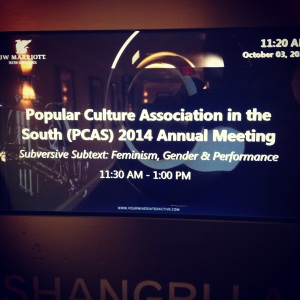This past spring I had the pleasure of attending two major national conferences to present my thesis research. In March I went to 4Cs 2015 (Conference for College Composition and Communication) in Tampa, and in April I went to PCA/ACA 2015 (Popular Culture/American Culture Association) in New Orleans. Now, I’m already in a very nurturing academic environment: my mentor is the best, my colleagues all intelligent, well-spoken, and accomplished, and my instructors are reasoned and brilliant. To be able to attend national conferences as a speaker as well as an audience member was the icing on the cake that has been the beginning of my career as a teacher and an academic.
So, just to kick things off, I’m lucky that I’m in the encouraging and open environment I’m in, and it’s given me a bit of a rose-coloured view of well-reasoned discourse. Even my students are a cut above the average first year comp crowd. They mostly listen, they try hard, and they ask questions when they aren’t drooling on their desks in a post-lunch coma. I like to think of myself as experienced, but I know that by virtue of simple linear time I am still a very new teacher, still learning how to enter academic discourse and join the conversation meaningfully, and I know that I have a long way to go before I’m anything remotely resembling a true expert in my field.
What’s that, humility from a graduate student? I know, I’m as surprised as you are.
My true surprise here is that, despite how much I have left to learn, I have trouble keeping out a feeling of disbelief when I go do national conferences and attend panels that are so rudimentary that I feel that even my semi-comatose college freshmen could put together a better reasoned research presentation.
I’m a newbie. I know this. But I see presenters who are professors emeritus, with multiple degrees, giving presentations about surface-level analysis of popular culture. I don’t feel like I’m doing my Tony Stark impression when I say that I could write a better analysis than these folks in my sleep.
(x)
Which is what this article is all about: pop culture and academia, and how it’s being handled. More specifically, how it’s being handled poorly, and how we can make it better.
Let me back up a little. Examples are helpful in any situation.
I’ve been taught by my professors that it’s important to treat one’s academic peers with respect, even if you disagree with their arguments and their work. It’s something I tell my students: being respectful costs nothing and earns you everything, especially in a world that is so much about who you know as you move forward.
However, I cannot help but use an example from my experience at PCA in New Orleans, because it was such a glaring example of surface-level, basic analysis that I would expect from an undergraduate paper being presented by academics with ‘professor emeritus’ behind their names.
That sounds harsh. I know it does. I don’t want to badmouth scholars or unfairly disrespect intelligent people. But here’s the thing: I can’t disagree with the arguments these presenters made because they didn’t make any actual arguments.
One speaker gave a presentation that compared and contrasted Sons of Anarchy with Hamlet.
That was it. No deeper ramifications. No analysis of what this did for popular culture. Nothing beyond what Sons of Anarchy creator Kurt Sutter has said himself in multiple interviews. Sons of Anarchy is Hamlet. If you have any knowledge of Shakespeare’s play and you’ve watched a few episodes of this show, this becomes blindingly obvious.
This presentation was not a fluke. Immediately following that speaker was the second speaker, who gave a presentation about House of Cards and Richard III. While they began with insight into the use of Shakespeare in popular culture and the timeless quality of the Bard’s stories, a cursory Google search led me to a New Yorker article that explained the Kevin Spacey-Richard connection far more eloquently than this presentation.
Now, don’t get me wrong, compare and contrast is useful. It’s relevant. It’s good to recognize the similarities and differences between works and the texts that inspired them. But this is basic, surface level analysis. It does one thing and one thing only: it points something out. It does not answer that fundamental question, my favourite one, the one I ask my students and my instructors have asked me:
SO WHAT?
These presentations are just two examples, but it’s a common trend in popular culture discourse in academia. While pop culture works become recognized as valid texts for analysis and criticism, many scholars don’t bother to go beyond a surface interpretation. They acknowledge that pop culture texts do the same work as Shakespeare but draw no conclusions as to what that even means, or why anyone should really consider that important.
This reflects in what I refer to as ‘pop academics’ as well. Bloggers, gamers, and fans conduct analysis on their favourite shows, books, and games all the time, and there’s often an attempt to make that discourse more valid by creating this level of obfuscating pretentiousness that screams ‘look at how well-read I am! Look at how intelligent I am! I can quote Shakespeare and Homer and draw comparisons between the theme of this poem and this videogame and that makes me smart!’
In this situation, I’m not giving you an example, but that’s because I honestly don’t have to. If you’ve spent five minutes on a games journalism website, you’ve seen what passes for discourse amongst the internet crowd. Or if you really want an example you can look at the post I made about it on my Tumblr last week. That’s also an option. While you’re at it, read the commentary made by Sam Keeper, who blogs over at Storming the Ivory Tower. If you don’t read their blog, go do that now, and if you’re here because they sent you a link to my blog, welcome! Enjoy your stay!
So, the discourse in pop culture analysis is weak, the examples are shallow, and the comparisons are less than impressive. As they say in Christopher Nolan’s Inception: We need to go deeper. As fans, as scholars, and as consumers of media, we need to do more than just acknowledge that House of Cards is Richard III, do more than throw in a few quotes from the Iliad to try to establish some ethos before talking about violent videogames. We need to define our terms, back up our statistics, acknowledge our limitations, and answer that ever-so important ‘so what’ question that should accompany every argument we ever make.
Just as it accompanies this article. So people only do surface-level analysis. So what? Hex, why should I, the average internet reader, give a shit?
Well, it’s simple: you should give a shit because you deserve to be part of a complex adult conversation, one that doesn’t bullshit or stop at entry-level basic ideas. Popular culture’s important revolves around that first word: popular. Not just in the definitional ‘lots of people like it’ popular, but the root of the word: it’s ‘of the people’. By and for the people. Popular culture has been doing more than providing passive entertainment since its creation, and in order to fully acknowledge that, we need to engage with popular culture texts in the same way we engage with every other text, as scholars and as fans.
So, here’s what we do.
It’s pretty radical, and it might be hard to swallow, but go with me here:
How about we read popular culture texts the same way we do EVERY OTHER ACADEMIC TEXT, and stop arguing about whether or not graphic novels or videogames are ‘valid’ cultural texts worthy of analysis.
I’ve got news: five minutes on the internet will tell you that they are. Pop culture reflects the people, just like those ever-touted Sacred Canon texts reflected the people of their time. I still laugh when people insist that Shakespeare is high culture. High culture? Go read a Shakespeare play, underline every instance of the word ‘sword’, and come back to me when you realize that yes, those are in fact penis jokes, and Shakespeare has more than enough additional sex jokes to boot.
Popular culture has more than a surface. Popular culture gets deep fast. Popular culture affects the people at the macro and the micro level (See my best friend Cat’s awesome tumblr post on media analysis for more on this). My personal experience is with videogames, and there is a lot more than just ‘this dude killing that dude’ going on in even the most simplistic, made-for-kids videogames.
Here’s one example: the other night, I’m playing Pokemon. Finally getting around to playing Pokemon Black, which has been sitting on my shelf for three years feeling abandoned while I ran around playing Pokemon X and Alpha Sapphire. I’m playing this game, and it’s like every other Pokemon experience: I catch Pokemon, I train them, I battle other trainers, I earn badges, I level up, woo hoo. That’s the game.
Except it isn’t just that.
So I make it to Nimbasa City (cool place, they have a ferris wheel, and I’m gonna have to find a ground-type Pokemon to level up to beat the electric gym) and my friend from the start of the game, Bianca, runs up and is WICKED EXCITED about something called Pokemon Musicals. I follow her (Because I got cut-scened – my Pokemon are FIGHTING FIGHTERS who do not feel the urge to dance and sing while wearing pretty bows. Also it was like 2 AM IRL and I really needed to find a Pokemon center like WHOA because route 4 has a brutal desert slog and half my team was passed out) and she gets stopped outside the music hall by her jerk dad, who’s been following her to try and talk her out of going on her Pokemon journey because it’s dangerous and she’s not ready for it. So I’m standing there watching two pixelated characters have the exact same argument I had with my parents when I wanted to move out of their house and live on my own during Undergrad.
This is a game about glorified cock fighting and suddenly I’m having feelings about the challenges parents and children face as they all grow up together. Why is it raining on my face?
Popular culture has more to offer us in so many ways. Let’s stop treating it like it only has something to say on the surface. Let’s engage with the text, ask questions of it, put it up against criticism and social issues. Pick it apart with the Triangle of Greek Rhetorical Devices and make arguments about it the way we do everything else in academics.
(x)
Don’t just write a book report. Don’t just compare item x with item y. Tell me WHY I should care. Answer my So What (or, if you look at the diagram, the kairos). As modern consumers, we are smarter than this basic-ass bullshit. I’m not just saying that because I have degrees and shit, this is stuff anyone and everyone can do.
So please. Tell me Sons of Anarchy is like Hamlet. But then, answer my ‘So What’ question with something real. Explain to me why I should care. That’s next-level discourse. That’s what you’d do if you were just reading Hamlet by itself. So do it for Sons of Anarchy too. Do it for Pokemon too. Do it for Alien: Isolation, Bioshock, Mass Effect, even Tekken.
Yes, I have done academic work on all of those games. The vast majority of them came up in my Master’s Thesis. The rest are in papers and articles I’m still working on. More on that in future articles.
You can analyze anything and everything, and you should, because EVERYTHING is an argument you can decipher, and if you’re aware of that, you’ve taken one more step into a better, more critically-aware world.
Plus then we can geek out together about videogames in academia.
I’m always down for that.








